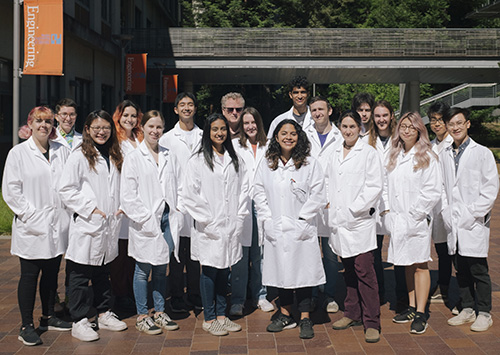Campus News
UCSC team scores gold for second straight year at iGEM synthetic biology competition
For the second year in a row, a team of UC Santa Cruz undergraduates won a gold medal at the International Genetically Engineered Machine (iGEM) Jamboree.

For the second year in a row, a team of UC Santa Cruz undergraduates won a gold medal at the International Genetically Engineered Machine (iGEM) Jamboree. The annual competition brings together student teams from around the world to present synthetic biology projects that aim to address pressing global issues.
UCSC’s iGEM team, one of 370 participating in this year’s event, developed a system called Progenie that’s designed to target and eliminate a toxic gene found in Shiga toxin-producing E. coli, a family of bacteria responsible for some of the most severe forms of food poisoning. Their method provides an effective alternative to the antibiotics commonly used in agriculture, which not only destroy helpful as well as harmful microbes, but are also responsible in part for the sharp rise in drug-resistant bacteria.
Co-captains Stephen Hwang, now a first-year biomolecular engineering and bioinformatics graduate student, and Torrey Brownell, a fourth-year biology student, explained that their team was inspired by a shared interest in environmental health and biology and a desire to address issues affecting the local agriculture industry.
“Developing our project idea took months of brainstorming, research, and outreach,” said Brownell. “We wanted our project to have a strong positive impact on our community and give us room to explore each of our scientific interests.”
Eager to ensure that their efforts would have a real-world impact, team UCSC solicited input from members of the local community who would benefit most from their new technology.
“This project was solidified after our team talked with local stakeholders—cattle ranchers, farmers, and packaging plant workers—and heard about the economic and food waste impact that occurs with foodborne bacterial outbreaks,” said Hwang.
Despite the challenges of having to collaborate remotely for the first three months of their project due to the COVID-19 pandemic, team UCSC’s momentum never wavered. They worked closely with their faculty advisor David Bernick, associate teaching professor of biomolecular engineering, who provided guidance and helped the team set goals and timelines. In March, they were able to begin in-person lab work on campus, allowing them to develop and test their system.
“One of the most fulfilling aspects of iGEM was helping a pandemic-starved group of students become the engineers and scientists that they have been dreaming about for years. This year, that ‘becoming’ was big, bold, and loud,” said Bernick.
At the jamboree, teams are judged on their virtual project posters, wiki pages, and video presentations. Teams are awarded gold medals if they demonstrate excellence across multiple categories and uphold the key iGEM principles of respect, community, and honesty.
When asked what factors contributed to their team’s success, Hwang and Brownell praised their team’s dynamic and each team member’s drive, support, and ability to learn from one another.
Hwang added that one of his most memorable experiences as an iGEM 2021 co-captain was watching less experienced team members grow into confident researchers.
“When planning experiments, we would often have the choice between allowing someone who was already skilled in the method get the experiment done quickly, or someone who didn’t have that background learn those new skills,” said Hwang. “By giving each team member the opportunity to learn a variety of skills, we developed a stronger, more versatile team.”
In addition to collaborating with one another and UCSC faculty members, team UCSC held frequent virtual meetings with faculty experts from Columbia University, Stanford University, and UC San Francisco, and even worked closely with a student research team from the Indian Institute of Science Education and Research Kolkata (IISER-Kolkata).
“With the support from IISER-Kolkata, the global impact and international ideas of iGEM were definitely true to our team,” said Brownell.
The 2021 UCSC team included co-captains Hwang and Brownell and members Rhea Kamath, Franklin Zheng, David Kelaita, Denise Calderon, Julia Howard, Tobin Berger-Cahn, Rose Delvillar, Nabil Mohammed, Yi-Chi Chu, Tanya Ivanov, Tarabryn Grismer, Wen Liu, Emily Hallamasek, and Fonz Gamino.
Though this year’s competition has ended, team UCSC has plans to move their project forward.